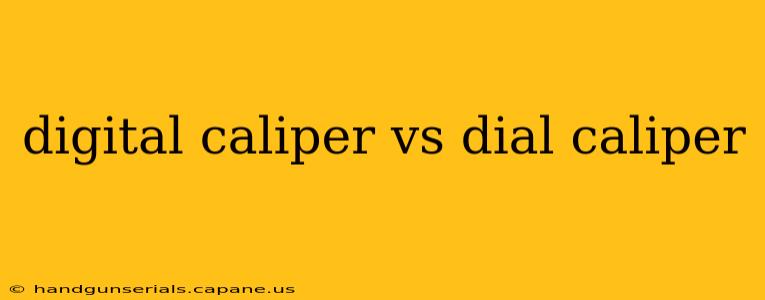Choosing between a digital caliper and a dial caliper can feel overwhelming, especially with the sheer variety available on the market. Both tools offer precise measurements, but their functionalities and user experiences differ significantly. This comprehensive guide will break down the key distinctions, helping you determine which caliper best suits your needs and budget.
Understanding the Fundamentals
Both digital and dial calipers are precision measuring instruments used to determine the dimensions of objects with high accuracy. They operate on the same basic principle—measuring the distance between two jaws—but their readout mechanisms differ dramatically, impacting usability and precision.
Dial Caliper: The Analog Approach
A dial caliper uses a mechanical system of gears and a rotating dial to display the measurement. A pointer on the dial indicates the measurement in fractions of an inch or millimeters.
Pros:
- Durability and Reliability: Dial calipers are generally more robust and less susceptible to damage from drops or impacts. Their mechanical design makes them less reliant on batteries or electronics.
- Cost-Effective: Typically less expensive than their digital counterparts, making them an attractive option for beginners or those on a budget.
- No Battery Dependence: Eliminates the worry of dead batteries during crucial measurements.
Cons:
- Parallax Error: Reading the dial can be challenging due to the angle at which the pointer is viewed. This parallax error can lead to inaccuracies.
- Slower Measurement: Reading the dial takes more time than reading a digital display.
- Lower Precision: While accurate, dial calipers typically offer slightly lower precision compared to digital calipers.
Digital Caliper: The Modern Approach
A digital caliper employs an electronic sensor and LCD display to provide a precise digital readout of the measurement. This digital display eliminates the need for interpreting a dial.
Pros:
- Easy Readability: The digital display ensures clear and unambiguous readings, reducing parallax errors.
- Faster Measurement: Measurements are instantly displayed on the screen, significantly speeding up the process.
- Higher Precision: Generally offer higher levels of precision, often measuring to thousandths of an inch or hundredths of a millimeter.
- Multiple Measurement Units: Most digital calipers offer the flexibility to switch between inches, millimeters, and sometimes even fractions.
- Data Holding & Zero Setting: Many models include features such as data hold (freezing the reading) and zero setting (setting the zero point at a specific location).
Cons:
- Higher Cost: Digital calipers typically command a higher price tag than dial calipers.
- Battery Dependence: Requires batteries, which can be a source of inconvenience if they run out.
- Susceptibility to Damage: The electronic components are more fragile and vulnerable to damage than the purely mechanical parts of a dial caliper.
Choosing the Right Caliper: A Decision Matrix
The best caliper for you depends on your specific needs and priorities:
| Feature | Dial Caliper | Digital Caliper |
|---|---|---|
| Cost | Lower | Higher |
| Readability | Less easy, prone to parallax error | Easy, clear digital display |
| Speed | Slower | Faster |
| Precision | Lower | Higher |
| Durability | Higher | Lower |
| Battery | No battery required | Battery required |
| Features | Limited | Often includes data hold, zero set |
Conclusion: A Matter of Priorities
Both digital and dial calipers are valuable tools with their own strengths and weaknesses. If budget is a primary concern and you prioritize durability, a dial caliper might be sufficient. However, for ease of use, speed, higher precision, and additional features, a digital caliper offers undeniable advantages. Consider your application, required precision, budget, and personal preferences when making your choice. By understanding the differences, you can confidently select the caliper that best meets your measurement needs.

